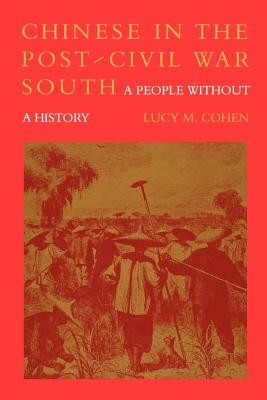
- We will send in 10–14 business days.
- Author: Lucy M Cohen
- Publisher: LSU Press
- ISBN-10: 0807124575
- ISBN-13: 9780807124574
- Format: 15.7 x 23.4 x 1.5 cm, softcover
- Language: English
- SAVE -10% with code: EXTRA
Reviews
Description
In much of the United States, immigrants from China banded together in self-enclosed communities, "Chinatowns," in which they retained their language, culture, and social organization. In the South, however, the Chinese began to merge into the surrounding communities within a single generation's time, quickly disappearing from historical accounts and becoming, as they themselves phrased it, a "mixed nation."
Lucy M. Cohen's Chinese in the Post-Civil War South traces the experience of the Chinese who came to the South during Reconstruction. Many of them were recruited by planters eager to fill the labor vacuum created by emancipation with "coolie" labor. The Planters' aims were obstructed in part by the federal government's determination not to allow the South the opportunity to create a new form of slavery. Some Chinese did, however, enter into labor contracts with planters--agreements that the planters often altered without consultation or negotiation with the workers. With the Chinese intent upon the inviolability of their contracts, the arrangements with the planters soon broke down. At the end of their employment on the plantations, some of the immigrants returned to China or departed for other areas of the United States. Still others, however, chose to remain near where they had been employed. Living in cultural isolation rather than in the China towns in major cities, the immigrants soon no longer used their original language to communicate within the home; they adopted new surnames, so that even among brothers and sisters variations of names existed; they formed no associations or guilds specific to their heritage; and they intermarried, so that a few generations later their physical features were no longer readily observable in their descendants. Based on extensive research in documents and family correspondence as well as interviews with descendants of the immigrants, this study by Lucy Cohen is the first history of the Chinese in the Reconstruction South--their rejection of the role that planter society had envisioned for them and their quick adaptation into a less rigid segment of rural southern society.EXTRA 10 % discount with code: EXTRA
The promotion ends in 17d.11:47:45
The discount code is valid when purchasing from 10 €. Discounts do not stack.
- Author: Lucy M Cohen
- Publisher: LSU Press
- ISBN-10: 0807124575
- ISBN-13: 9780807124574
- Format: 15.7 x 23.4 x 1.5 cm, softcover
- Language: English English
In much of the United States, immigrants from China banded together in self-enclosed communities, "Chinatowns," in which they retained their language, culture, and social organization. In the South, however, the Chinese began to merge into the surrounding communities within a single generation's time, quickly disappearing from historical accounts and becoming, as they themselves phrased it, a "mixed nation."
Lucy M. Cohen's Chinese in the Post-Civil War South traces the experience of the Chinese who came to the South during Reconstruction. Many of them were recruited by planters eager to fill the labor vacuum created by emancipation with "coolie" labor. The Planters' aims were obstructed in part by the federal government's determination not to allow the South the opportunity to create a new form of slavery. Some Chinese did, however, enter into labor contracts with planters--agreements that the planters often altered without consultation or negotiation with the workers. With the Chinese intent upon the inviolability of their contracts, the arrangements with the planters soon broke down. At the end of their employment on the plantations, some of the immigrants returned to China or departed for other areas of the United States. Still others, however, chose to remain near where they had been employed. Living in cultural isolation rather than in the China towns in major cities, the immigrants soon no longer used their original language to communicate within the home; they adopted new surnames, so that even among brothers and sisters variations of names existed; they formed no associations or guilds specific to their heritage; and they intermarried, so that a few generations later their physical features were no longer readily observable in their descendants. Based on extensive research in documents and family correspondence as well as interviews with descendants of the immigrants, this study by Lucy Cohen is the first history of the Chinese in the Reconstruction South--their rejection of the role that planter society had envisioned for them and their quick adaptation into a less rigid segment of rural southern society.

Reviews